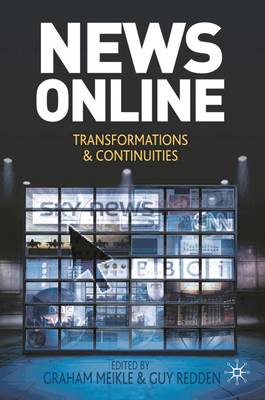
Bedankt voor het vertrouwen het afgelopen jaar! Om jou te bedanken bieden we GRATIS verzending (in België) aan op alles gedurende de hele maand januari.
- Afhalen na 1 uur in een winkel met voorraad
- In januari gratis thuislevering in België
- Ruim aanbod met 7 miljoen producten
Bedankt voor het vertrouwen het afgelopen jaar! Om jou te bedanken bieden we GRATIS verzending (in België) aan op alles gedurende de hele maand januari.
- Afhalen na 1 uur in een winkel met voorraad
- In januari gratis thuislevering in België
- Ruim aanbod met 7 miljoen producten
Zoeken
€ 115,95
+ 231 punten
Uitvoering
Omschrijving
News matters. It is still the main forum for discussion of issues of public importance. It is where we come together to inform, persuade, influence, endorse or reject one another in a collaborative process of making meaning from events. But the news is changing--content, distribution channels, geographical constraints, production values, business models, regulatory approaches and cultural habits are all in flux, as new media technologies are adopted and adapted by users. Established media organisations are in many cases struggling to adapt to a changed environment--even though they have driven many of the changes themselves. This book charts a course through these upheavals. It ranges over a broad terrain--from the BBC to experimental videogames, from Latin American newsrooms to Northeast Asian blogs, from the crisis in US newspapers to Twitter users in Iran. Its chapters are written by leading international scholars, who question established understandings of news in the light of change. They consider the shifting boundaries between the popular and the professional made possible by the redistribution of news functions. They analyse how popular digital communications change relations of production and consumption, and of cultural and political participation.
Specificaties
Betrokkenen
- Auteur(s):
- Uitgeverij:
Inhoud
- Aantal bladzijden:
- 240
- Taal:
- Engels
Eigenschappen
- Productcode (EAN):
- 9780230233447
- Verschijningsdatum:
- 26/10/2010
- Uitvoering:
- Hardcover
- Formaat:
- Ongenaaid / garenloos gebonden
- Afmetingen:
- 157 mm x 236 mm
- Gewicht:
- 476 g

Alleen bij Standaard Boekhandel
+ 231 punten op je klantenkaart van Standaard Boekhandel
Beoordelingen
We publiceren alleen reviews die voldoen aan de voorwaarden voor reviews. Bekijk onze voorwaarden voor reviews.









